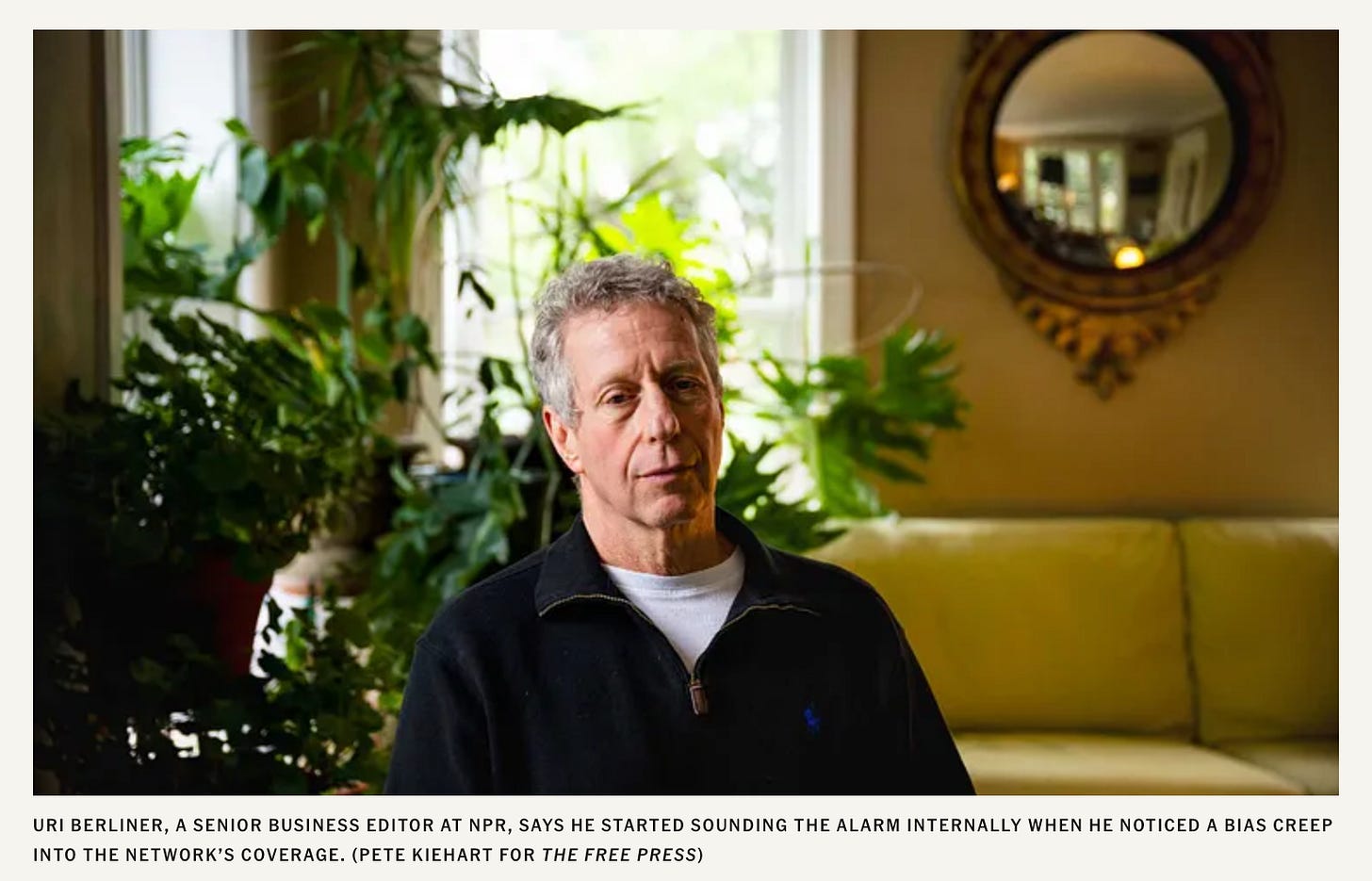As Vermont Public Pressed On, A Seasoned NPR Reporter Warned That NPR Was Losing the Public Trust
Vermont's Public Media system has a rare opportunity to make up for NPR's abandonment from viewpoint diversity.
Here in the Green Mountains, many Vermonters start their days with the familiar voices of Vermont Public, the local gateway to the national conversation curated by NPR. It's a trusted companion for the drive to work, for time in the barn, or for quiet moments with a cup of coffee.
That’s why a recent critique from a 25-year veteran of National Public Radio itself warrants a moment of quiet reflection, even for its most devoted listeners.
Uri Berliner, a senior business editor at NPR until this past spring, penned an essay that raises serious questions about the direction of the news organization Vermont relies on. He argues that a once "open-minded, curious culture" has given way to a narrower, more rigid worldview that is alienating a significant portion of the American public.
Once an NPR Model Reporter
According to Berliner, who describes himself as a liberal who "fit the NPR mold," the shift is quantifiable. He points to the changing demographics of NPR's listenership. In 2011, he writes, the audience was a closer reflection of America at large, with 26 percent identifying as conservative and 23 percent as "middle of the road." By 2023, those numbers had starkly changed. The share of self-described conservatives had plummeted to just 11 percent, while liberals made up 67 percent of the audience.
For Berliner, this isn't just a business problem; it's a journalistic one. He presents several instances where he believes an ideological "groupthink" led to significant reporting failures, eroding public trust.
Infected by Trump
One of the central exhibits in his argument is NPR's coverage of the Trump-Russia collusion allegations. Berliner claims that what started as "tough, straightforward coverage" soon "veered toward efforts to damage or topple Trump’s presidency." He asserts that the network hitched its wagon to Representative Adam Schiff, the most visible proponent of the collusion narrative. Berliner counted 25 separate interviews with Schiff on the topic, where his talking points, according to the author, "became the drumbeat of NPR news reports."
The problem, Berliner writes, is what happened after the Mueller report found no credible evidence of collusion. He claims NPR’s coverage of that development was "notably sparse" and that the "Russiagate" narrative "quietly faded from our programming" with no self-reflection or admission of error. "What’s worse" than blowing a major story, he argues, "is to pretend it never happened."
What Laptop?
He details a similar pattern with the Hunter Biden laptop story in October 2020. Berliner states that NPR "turned a blind eye." He cites the organization's managing editor for news at the time, who explained the decision by saying, “We don’t want to waste our time on stories that are not really stories." Berliner contends the story was indeed newsworthy and that the instinct to pursue a hot lead was "squelched" by political considerations. He recalls a colleague expressing relief that they weren't covering the story because it could have helped Donald Trump's reelection chances.
Missing the Lab Leak
A third example offered by Berliner concerns coverage of the COVID-19 pandemic's origins. He argues that NPR quickly and fervently joined "Team Natural Origin," dismissing the possibility of a lab leak as a "racist or a right-wing conspiracy theory." He claims the network's reporting declared the lab leak theory "debunked by scientists," even as compelling, though not conclusive, evidence for it emerged. Politics, he writes, were "blotting out the curiosity and independence that ought to have been driving our work."
These reporting decisions, in Berliner's view, are symptoms of a deeper cultural shift within the organization, a shift he says accelerated after the murder of George Floyd in 2020 under former CEO John Lansing.
A New Mission: Agents of Change
According to Berliner, the message from the top was no longer simply to report the news, but to be "agents of change." He quotes Lansing directly: "When it comes to identifying and ending systemic racism... we can be agents of change." Diversity became the organization's "North Star," and, Berliner claims, race and identity became paramount in nearly every facet of the workplace. He describes new requirements to ask all interview subjects for their race and gender for a central tracking system and the proliferation of internal affinity groups based on identity.
Goodbye to Viewpoint Diversity
While these initiatives may be seen as progressive and inclusive, Berliner argues they contributed to the most damaging development of all: "the absence of viewpoint diversity." He contends that people at every level of NPR have "comfortably coalesced around the progressive worldview," creating an echo chamber where curiosity about differing perspectives has withered.
Vermont Public’s Opportunity
Berliner's critique is that of an insider, a long-serving journalist who believes the institution he dedicated his career to has lost its way by abandoning a spirit of open inquiry.
For those of us here in Vermont who value the role of public media, his warning is a challenging one. It asks us to consider whether the national conversation we tune into every day is reflecting all of America, or just one small, distilled segment of it, and whether Vermont Public, and independent media, will flex that independence.


